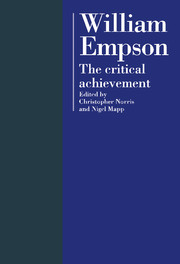Book contents
- Frontmatter
- Contents
- Contributors
- Foreword
- 1 Introduction: Empson as literary theorist: from Ambiguity to Complex Words and beyond
- 2 Empsonian honesty and the beginnings of individualism
- 3 Empson, Leavis, and the challenge of Milton
- 4 Empson's Satan: an ambiguous character of the seventh type
- 5 Compacted doctrines: Empson and the meanings of words
- 6 Figural narrative and plot construction: Empson on pastoral
- 7 More lurid figures: de Man reading Empson
- 8 Fool and pharmakon
- 9 William Empson's cosmicomics
- 10 Empson as teacher: the Sheffield years
- References
- Index
1 - Introduction: Empson as literary theorist: from Ambiguity to Complex Words and beyond
Published online by Cambridge University Press: 01 June 2011
- Frontmatter
- Contents
- Contributors
- Foreword
- 1 Introduction: Empson as literary theorist: from Ambiguity to Complex Words and beyond
- 2 Empsonian honesty and the beginnings of individualism
- 3 Empson, Leavis, and the challenge of Milton
- 4 Empson's Satan: an ambiguous character of the seventh type
- 5 Compacted doctrines: Empson and the meanings of words
- 6 Figural narrative and plot construction: Empson on pastoral
- 7 More lurid figures: de Man reading Empson
- 8 Fool and pharmakon
- 9 William Empson's cosmicomics
- 10 Empson as teacher: the Sheffield years
- References
- Index
Summary
William Empson didn't read much in the way of recent (post-1970) literary theory, but made it very clear that he disliked — even hated - those few books and articles that latterly came in for review, or that well-meaning commentators (myself included) sent along in the hope of provoking some lively response. His aversion to ‘theory’ has been found rather puzzling by many of Empson's younger admirers since he was, after all, by widespread assent the most theoretically minded and intellectually resourceful of twentieth-century English critics, as well as having written - in The Structure of Complex Words - a book which explored philosophical issues with a fine disregard for the standard academic division of intellectual labour. But the whole point of Complex Words was to rescue literature from the vagaries of subjective or emotive response by providing some more or less adequate bits of theoretical ‘machinery’ - the equations, or various forms of logicosemantic entailment - by which to make sense of multiple meaning without falling back on the catch-all notion of poetic ‘ambiguity’, or (even worse) the irrationalist rhetoric of ‘paradox’ raised into a quasi-theological absolute by the adepts of American New Criticism. The only use for theory in literary studies was to clear away non-existent problems and sources of bafflement - doctrines like emotivism and the so-called ‘Intentional Fallacy’ - and show the way back to a decent respect for authorial meaning, historical context and literature's capacity to communicate truths of human experience despite all the difficulties dreamed up by theorists in the grip of some modish sceptical dogma.
- Type
- Chapter
- Information
- William EmpsonThe Critical Achievement, pp. 1 - 120Publisher: Cambridge University PressPrint publication year: 1993
- 2
- Cited by

